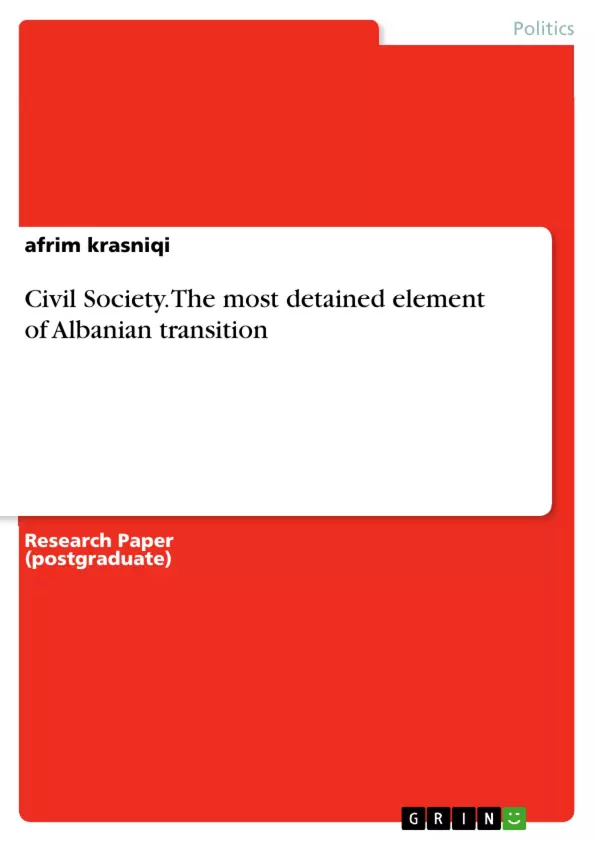In 1990 Albania changed its political system. In 2006 it signed Stabilization Association Agreement with EU and in 2008 received the invitation to NATO membership. 18 years ago it was hard to find a single Albanian who believed the process of democratic transformation would take more than one decade to ensure a place in the European community. Today it is hard to find a single Albanian who believes the country will reach European economic and democratic standards without passing another decade. This evolution reflects the long and difficult the Albanian society has passed from the utopia of 90’ in realization and needs for democratic reforms in a new century.
Civil society in Albania is organic part of this change, prolonged transition, delays in
democratic strengthening, lack of tradition and problematic inheritance of the past. It hasn’t succeeded to forerun political society, but it has walked behind it, as a new sector, fragile, yet not solid. Being such it appears as the most detained element of Albanian transition and in the same time still far from the model of west democratic societies.
To the Albanian civil society it is urgent need full competition of the process of its unmithization, its amalgamation to vertical and horizontal cuttings of society, its identification with visions and projects proceeding development. Its next challenge remains transformation into a functional and effective institution, reliable and partner to other actors in society.
A positive sign to a more solid future for the civil society is the existence of a population relatively young (average age 26 years old), multidimensional exposure to west world, the ending of conflicts and initiation of regional integration into EU, as the always growing expansion of information resources.
Table of Contents
- Civil Society: The most detained element of Albanian transition
- Birth of civil society, identity problems
- Field of activity
- Legislation on organizations of civil society
Objectives and Key Themes
This text explores the development and challenges of civil society in post-communist Albania. It examines the historical context, the legacy of the communist regime, and the evolution of civil society organizations.
- The impact of the communist regime on the formation of civil society
- The emergence and evolution of civil society organizations in Albania
- The challenges facing civil society in Albania, including financing and political influence
- The relationship between civil society and the state
- The role of international donors in supporting civil society in Albania
Chapter Summaries
- The first section of the text establishes a historical context for the development of civil society in Albania, outlining the repressive nature of the communist regime and its impact on the formation of independent organizations. It emphasizes the lack of democratic traditions and the absence of independent civic action within the communist system.
- The second section focuses on the birth and evolution of civil society in post-communist Albania. It examines the initial difficulties in understanding and accepting the concept of civil society, highlighting the challenges of navigating the transition from a highly centralized and controlled system to one with a greater degree of openness and freedom.
- The third section delves into the activities and challenges faced by civil society organizations in Albania. It discusses the diverse fields of activity, including cultural initiatives, women's rights, environmental protection, and youth programs. It also analyzes the issue of financing, highlighting the reliance on international donors and the limited role of private funding.
- The fourth section provides a detailed account of the legislative framework governing civil society organizations in Albania. It examines the evolution of laws governing nonprofit organizations and the challenges of ensuring their independence and autonomy from state control. It also explores the debate around financing and the potential risks associated with financial transparency.
Keywords
This text explores the key concepts of civil society, the legacy of communism, the transition to democracy, and the development of nonprofit organizations. It examines the role of international donors, the challenges of financing, and the relationship between civil society and the state in the context of Albanian society.
Frequently Asked Questions
What is the main challenge for civil society in Albania?
The main challenges include a lack of tradition, the problematic inheritance of the communist past, and a fragile structure that struggles to influence political society.
How did the communist regime affect Albanian civic action?
The repressive regime prevented the formation of independent organizations, leaving a vacuum of democratic traditions after its fall in 1990.
What role do international donors play?
Albanian civil society is heavily reliant on international donors for financing, which raises questions about its long-term sustainability and independence.
Is there a legal framework for NGOs in Albania?
Yes, legislation has evolved to govern nonprofit organizations, although ensuring their autonomy from state control remains a point of debate.
Why is the young average age of the population significant?
With an average age of 26, the young population's exposure to Western values and information resources is seen as a positive sign for a more solid future for civil society.
- Citar trabajo
- afrim krasniqi (Autor), 2006, Civil Society. The most detained element of Albanian transition, Múnich, GRIN Verlag, https://www.grin.com/document/266562



